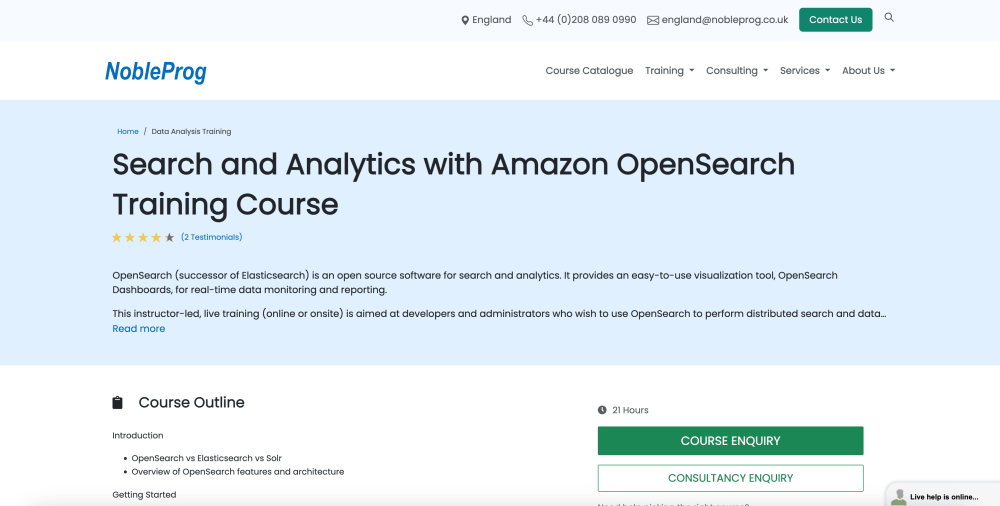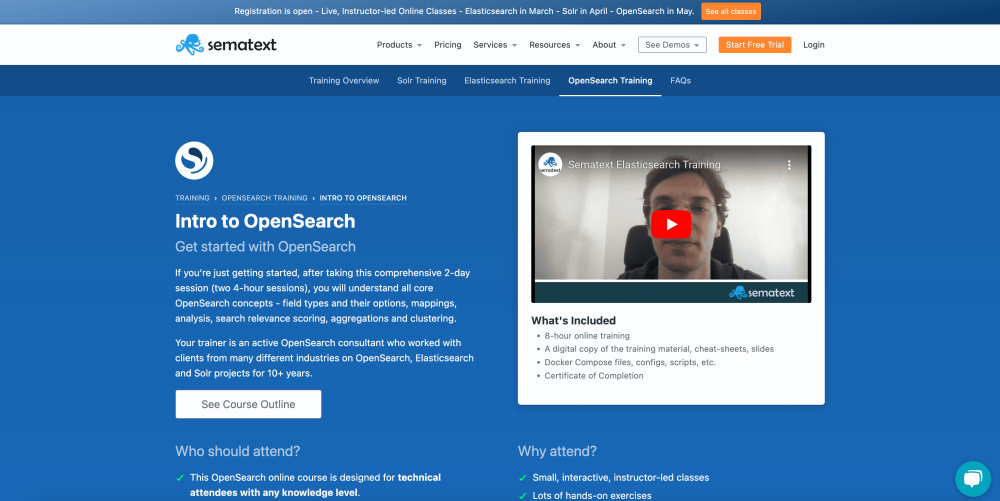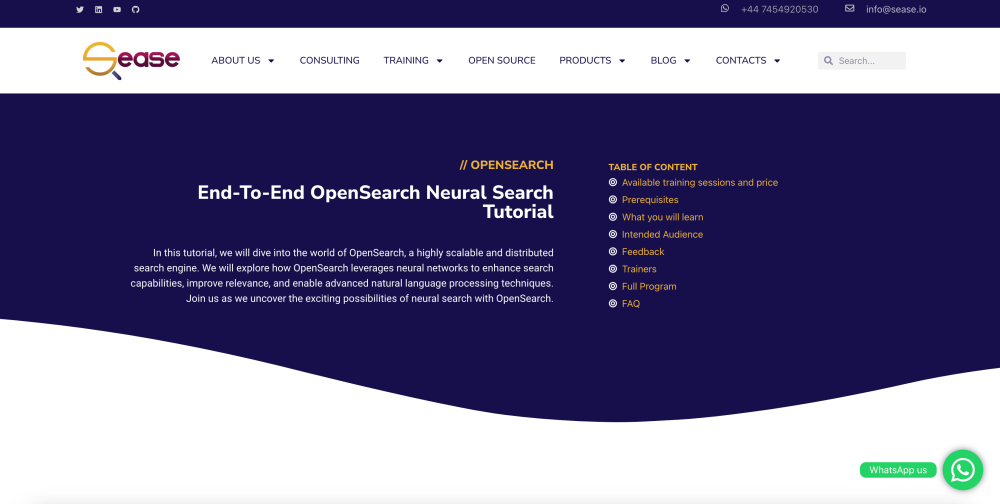Resources
5 min read
OpenSearch has grown to be one of the most widely used open-source search engine projects. The high flexibility of the solution enables it to be the perfect option for a broad range of use cases, such as log and event data analysis, application monitoring and metrics analysis, and security information and event management (SIEM). Whilst, OpenSearch is fairly simple to use, to ensure that users are utilizing the tool effectively and comprehend the extensive range of uses, conducting OpenSearch training is encouraged.
For users looking to deepen their knowledge of OpenSearch and use the solution to better effect at their organization, there’s a variety of training options available to meet almost any requirements. There are OpenSearch online courses, instructor-led courses, and certification courses.
To assist you with selecting the best option, this article will outline why you should enroll in OpenSearch training and list the best OpenSearch training courses currently available.
Contents
What is OpenSearch?
OpenSearch is an open-source search engine project. It is built upon the foundation of Elasticsearch, a distributed, RESTful search and analytics engine capable of solving a wide variety of use cases. OpenSearch offers powerful full-text search capabilities, real-time analytics, and detailed querying. It's regularly used for log and event data analysis, application monitoring, and more. Additionally, the tool is scalable and reasonably simple to use, making it a popular choice for developers and organizations that are in need of robust search functionality.
Why Enroll in an OpenSearch Training Course?
Conducting OpenSearch training at your organization is advantageous to both the user participating in the training and the organization as a whole. Firstly, OpenSearch is a feature-rich search and analytics engine offering numerous capabilities. Training enabled users to be acquainted with all the features and functionalities, enabling them to gain the full potential of the platform. This includes understanding how to configure indexes, perform advanced queries, set up data visualization dashboards, and use plugins for specific use cases.
In addition to this training provides users with the skills required to extract meaningful insights from data using OpenSearch. They can learn how to write complex queries, examine trends and patterns, perform aggregations, and visualize data using tools like Kibana. This allows them to uncover valuable insights, highlight opportunities, and make data-driven decisions that drive business growth and innovation.
In regards to the benefits to the organization, comprehensive training equips administrators and DevOps teams with the knowledge needed to efficiently deploy, manage, and maintain OpenSearch clusters. This includes tasks such as capacity planning, performance tuning, security configuration, and troubleshooting common issues. By investing in OpenSearch training, organizations can reduce downtime, optimize resource utilization, and guarantee the stability and reliability of their OpenSearch deployments.
Also, OpenSearch training covers best practices for securing data and clusters, including authentication, authorization, encryption, and compliance with data protection regulations. As well as offering guidance on implementing security monitoring and incident response procedures to quickly detect and respond to security threats. This aids organizations in strengthening their security posture and mitigating the risk of data breaches and unauthorized access.
OpenSearch Training
OpenSearch training can be carried out in numerous formats and due to the requirements of an organization or participant, one format may be more appropriate than the others. So, for this reason, we have split the OpenSearch training section into three lists, instructor-led, online only, and certification.
Instructor-Led Courses
An instructor-led OpenSearch training course is a structured learning experience where participants are guided by an instructor in a traditional classroom or virtual setting. The instructor delivers the course content through lectures, presentations, demonstrations, and discussions, while participants engage in hands-on exercises, group activities, and interactive learning experiences.
Framework Training

Framework training offers a comprehensive instructor-led OpenSearch training course that provides users with practical skills in formulating powerful and relevant search and data analysis solutions using OpenSearch. The course will cover an extensive variety of topics including the architecture of OpenSearch, configuration, mappings, search, aggregations, analyzers, data modeling and relational data, indexing strategies, OpenSearch best practices, Kibana and dashboards, and backup/disaster recovery. The typical duration of the course is 2 days in their London training centre, however, other locations can be arranged. Pricing and availability are not disclosed on their website so for this information you will need to get in touch with Framework Training.
NobleProg

The next instructor-led OpenSearch training course in our list is provided by NobleProg. The course will be conducted with interactive lectures and discussions and offer participants numerous exercises with hands-on implementation in a live-lab environment. The course is particularly thorough and includes topics such as setup and configuration, indexing data, adding a data stream, searching and aggregating data, working with API, using OpenSearch dashboards, securing OpenSearch, managing OpenSearch plugins, integrating clients and tools, and troubleshooting and maintenance. The course sets requirements that participants must have familiarity with Elasticsearch and Kibana and possess experience in software development. Similar to Framework Training, for pricing and availability you will need to get in contact with NobleProg.
Sematext

Sematext is another company that provides an instructor-led OpenSearch training course. With their Intro to OpenSearch course, you will gain access to an in-depth 2-day course (two 4-hour sessions). Here you will understand all of the core OpenSearch concepts, including field types and their options, mappings, analysis, search relevance scoring, aggregations, and clustering. The course offers hands-on exercises, a certificate upon completion, and is conducted entirely online so there are no travel requirements. The price of the Sematext Intro to OpenSearch is $800.
Self-Paced Online Courses
An OpenSearch self-paced online course allows learners to study and progress through the material at their speed and convenience. Unlike traditional classroom-based courses or instructor-led training, self-paced online courses offer flexibility and autonomy, allowing students to set their own schedule and learning pace.
OpenSource Connections

The first OpenSearch self-paced online training course included in our list is OpenSearch Training: ‘Think Like a Relevance Engineer’ – TLRE provided by OpenSource Connections. This two-part OpenSearch training equips participants with the necessary skills to address search relevance challenges effectively. The course delves into various aspects of OpenSearch, allowing search teams to grasp methods for evaluating search quality and refining relevance based on these quality metrics. The training is provided through the online platform Moodle and offers prerecorded videos, slides, labs, and quizzes. The OpenSource Connections course is priced at $750.
Sease

Sease provides a more specific OpenSearch training course than the other examples, offering an End-To-End OpenSearch Neural Search Tutorial. This course highlights how OpenSearch leverages neural networks to enhance search capabilities, improve relevance, and enable advanced natural language processing techniques. The course demands participants to have a basic understanding of search engines, neural search principles, and OpenSearch before enrolling. The self-paced online format for this OpenSearch training course is just £200.
If you've enjoyed this article why not read OpenSearch vs Solr or The Top 10 OpenSearch Plugins next?
